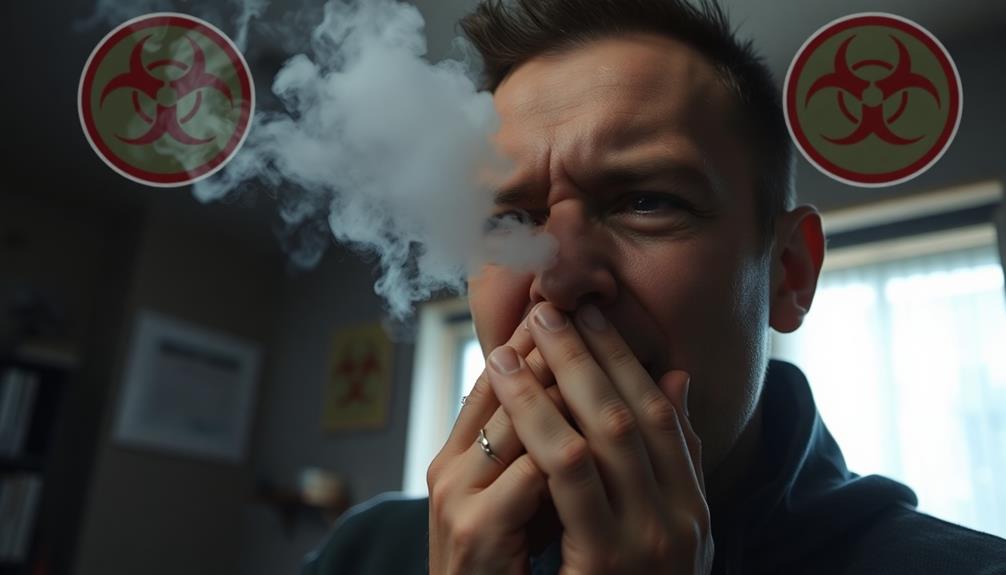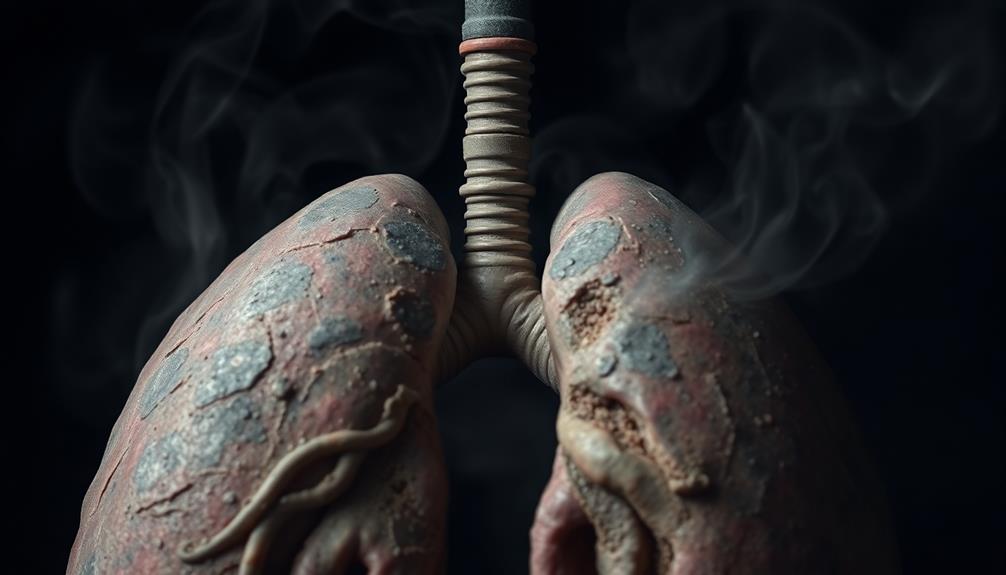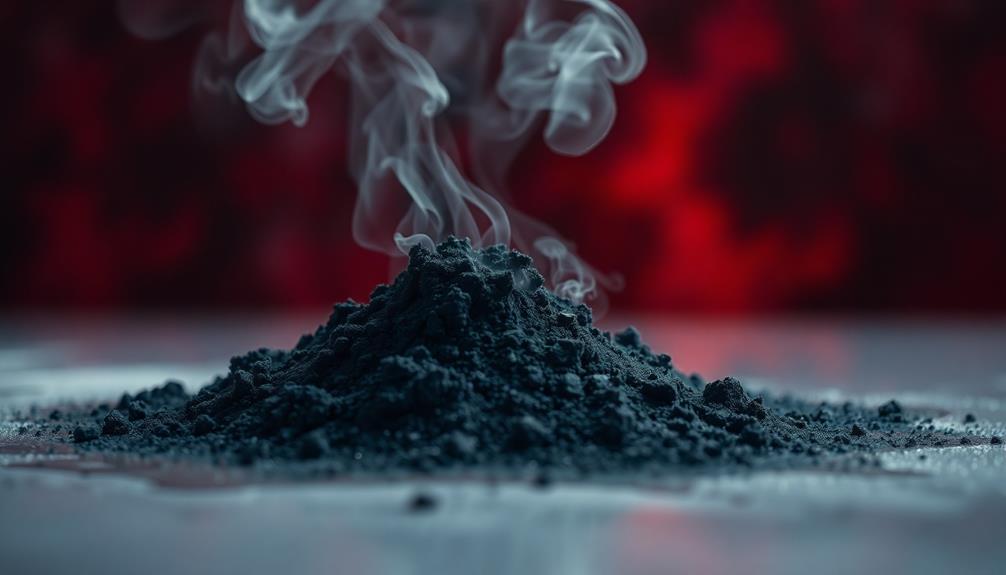Ammonia breath smells sharp and pungent, much like urine. If you've eaten a lot of high-protein foods, you might notice this strong odor more. This smell can signal health issues, especially related to kidney problems. When your kidneys don't function well, ammonia builds up in your body. It's also important to stay hydrated since dehydration can make the smell worse. So, if you ever notice this type of breath, it's a good idea to consult a healthcare professional. Understanding this sign can really help you take charge of your health and well-being in the future!
Key Takeaways
- Ammonia breath has a sharp, pungent odor that resembles the smell of urine.
- The odor intensifies after consuming high-protein foods, due to urea breakdown.
- Dehydration can exacerbate the smell by reducing saliva production in the mouth.
- Individuals with chronic kidney disease or liver dysfunction often experience ammonia breath.
- Awareness of this odor is crucial for early detection of potential health issues.
Introduction

When you notice a strong, ammonia-like smell on your breath, it's more than just an unpleasant odor; it often signals an underlying health issue. This condition, known as ammonia breath or uremic fetor, can make your breath smell like urine.
It usually means that your body has elevated ammonia levels because your kidneys aren't working properly. Kidney dysfunction, including chronic kidney disease (CKD), affects about 30 million adults in America.
If you catch yourself noticing this distinct odor, don't ignore it. Ammonia breath can hint at serious underlying health conditions. It might come along with other symptoms like fatigue, nausea, or confusion, which can indicate metabolic disturbances in your body.
Getting a medical evaluation is essential. Doctors often use breath tests and blood tests to check your kidney function and ammonia levels accurately.
Early detection is crucial, as it can lead to better health outcomes. So, if you experience ammonia breath, consider reaching out to your healthcare provider. They can help you understand what's going on and guide you toward the right treatment.
Your health is important, and catching these signs early can make a big difference!
Description of the Smell

Ammonia breath has a distinct and unmistakable odor, often described as sharp, pungent, and reminiscent of urine or cat litter. When you notice this smell, it usually means there's an increase in ammonia in your breath. This often happens when your kidneys aren't working well, especially if you're dealing with a condition called uremic fetor.
You might find that the odor becomes stronger after eating high-protein foods. This is because your body breaks down protein, which can lead to more ammonia production. If you smell this strong odor, it could signal an underlying health issue that needs attention.
It's essential to pay attention to the smell of your breath, as it can be a warning sign. Early detection can help in managing any kidney problems or other health conditions effectively.
Source and Composition

The source of ammonia breath primarily stems from the body's metabolism of urea, which is a waste product formed during protein digestion.
When your kidneys are working well, they filter urea out of your blood. However, if kidney function is impaired, urea breaks down into ammonia, leading to that distinct smell often compared to urine.
This ammonia breath can signal health issues, especially if nitrogenous compounds build up in your body.
Dehydration, high protein diets, and certain metabolic disorders can also increase ammonia levels in your bloodstream.
When you're dehydrated, your body has trouble getting rid of waste, making the ammonia smell even stronger.
Additionally, breath analysis can detect volatile compounds linked to ammonia, giving doctors clues about any underlying problems with your kidneys or liver.
Typical Scenarios or Environments

Experiencing ammonia breath often occurs in specific situations, especially for those with chronic kidney disease or liver dysfunction. When your body can't effectively remove waste products, ammonia builds up and gets released in your exhaled breath. This odor often smells like urine, which can be quite unpleasant.
You might notice ammonia breath after eating high-protein foods. These foods increase the production of ammonia through metabolic processes in your body.
It's also important to consider dehydration. When you're dehydrated, saliva decreases, making the smell of ammonia more pronounced. Dehydration can cause your body to become imbalanced, leading to more concentrated compounds in your saliva that may alter its scent. In such cases, the normal smell of saliva is affected, giving rise to a stronger, often unpleasant odor. Ensuring adequate hydration is crucial to maintaining the body’s balance and preventing such changes in salivary composition.
In certain environments, such as farms or industrial settings, you may encounter high concentrations of ammonia. Here, the smell can serve as a warning sign of potential health risks from ammonia exposure.
If you find yourself in any of these scenarios, it's a good idea to pay attention. Ammonia breath can be a sign of underlying health issues or simply a result of what you've eaten or how hydrated you are.
Addressing these factors can help you manage the unpleasant odor and improve your overall well-being!
Emotional or Cultural Associations

Strong breath odors, like ammonia breath, can significantly affect how you feel about yourself and how others perceive you. When you experience ammonia breath, it might bring feelings of embarrassment and distress. Many people associate this odor with serious health complications, which can lead to a decrease in self-esteem.
It's tough to feel confident in social interactions when you worry about your breath. Cultural perceptions also play a role. In some cultures, foul breath, including ammonia breath, is linked to dietary habits and oral hygiene. This can reinforce the idea that maintaining good health is essential for social standing.
If you don't take care of your oral hygiene, it might lead to stigmatization or avoidance from others. The emotional impact of ammonia breath can be overwhelming, making you feel self-conscious in intimate or public settings.
However, support from healthcare providers and peer groups can help you cope with these health challenges. Connecting with others who understand your situation can foster a sense of community.
Health or Safety Considerations

When ammonia breath appears, it can signal underlying health issues, particularly related to kidney function. This strong odor, often compared to urine or cleaning products, might indicate kidney disease or other metabolic disorders. If you notice ammonia breath, it's essential to understand the possible causes of ammonia breath and the serious health risks involved. High ammonia levels can lead to confusion and fatigue, making a medical evaluation crucial.
Chronic kidney disease (CKD) affects about 30 million American adults. If you have CKD, your body may struggle to remove waste effectively, leading to bad breath. Maintaining good oral hygiene can help, but hydration is just as important. Dehydration can concentrate urea in your bloodstream, increasing ammonia production and worsening the smell.
Be mindful of any symptoms that accompany ammonia breath. Early detection is vital, as untreated kidney or liver issues can lead to severe complications, like hepatic encephalopathy.
If you or someone you know experiences ammonia breath, don't hesitate to seek medical advice. Addressing these symptoms early can make a significant difference in your overall health.
Final Thoughts

Ammonia breath can be a concerning sign of underlying health issues, particularly related to kidney function. When you notice that your breath smells like ammonia, also known as uremic fetor, it could indicate serious health complications, such as chronic kidney disease. This occurs when your kidneys can't filter waste properly, leading to ammonia buildup in your body.
Additionally, factors like high-protein diets and dehydration can make your breath smell like ammonia too.
It's important to remember that early detection is key. If you catch this odor, it's a good idea to consult a healthcare professional. They can help identify any underlying kidney dysfunction or other causes, allowing you to take action before serious health issues develop.
Being aware of these signs can empower you to take charge of your health. Remember, ammonia breath can signal more than just bad breath; it's your body's way of communicating that something might be wrong.
Frequently Asked Questions
How Do You Know if You Have Ammonia Breath?
You'll notice ammonia breath if you detect a strong, pungent odor when you exhale. Pay attention to other symptoms like fatigue or confusion, and don't hesitate to consult a doctor for proper evaluation.
What Does Ammonia Odor Smell Like?
Ammonia odor hits you with a sharp, pungent scent that resembles stale urine or fish. It can be quite overwhelming and unpleasant, often signaling underlying health issues that you should definitely get checked out.
What Virus Does Breath Smell Like Ammonia?
When you're dealing with a viral infection, your breath might smell like ammonia due to underlying kidney issues. These conditions can hinder your body's ability to filter waste, leading to that distinct odor during illness.
What Does Uremic Breath Smell Like?
Uremic breath has a strong, pungent odor that resembles ammonia or urine. If you notice this smell, it's essential to seek medical attention, as it may indicate significant kidney dysfunction and underlying health issues.









